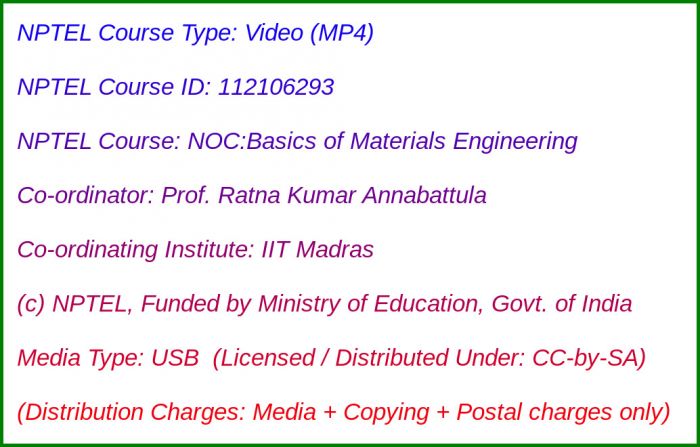
Media Storage Type : 32 GB USB Stick
NPTEL Subject Matter Expert : Prof. Ratna Kumar Annabattula
NPTEL Co-ordinating Institute : IIT Madras
NPTEL Lecture Count : 67
NPTEL Course Size : 11 GB
NPTEL PDF Text Transcription : Available and Included
NPTEL Subtitle Transcription : Available and Included (SRT)
Lecture Titles:
Lecture 1 - Introduction
Lecture 2 - Material Property Landscape
Lecture 3 - Crystal Structure-1 (Platonic Solids)
Lecture 4 - Crystal Structure-2 (Unit Cell, Lattice, Crystal)
Lecture 5 - Crystal Structure-3 (Bravais lattice, Symmetry in Crystals)
Lecture 6 - Crystal Structure-4 (Miller Indices for Crystallographic Points and Directions)
Lecture 7 - Crystal Structure-5 (Miller-Brvais Indices, Linear and Planar Density)
Lecture 8 - Crystal Structure-6 (Planar desnity, Close-Packed Structures, Stacking Faults)
Lecture 9 - Crystal Structure-7 (Single Crystal and Polycrystalline Materials)
Lecture 10 - Crystal Structure-8 (X-Ray Diffraction and Determination of Structure)
Lecture 11 - Defects in Crystalline Materials-1 (Types of Crystalline Defects)
Lecture 12 - Defects in Crystalline Materials-1 (Point Defects)
Lecture 13 - Defects in Crystalline Materials-1 (Equilibrium Concentration of Vacancies)
Lecture 14 - Defects in Crystalline Materials-1 (Theoretical Shear Strength)
Lecture 15 - Defects in Crystalline Materials-2 (Effect of Point Defects)
Lecture 16 - Defects in Crystalline Materials-2 (Point Defects and Solid Solutions)
Lecture 17 - Defects in Crystalline Materials-3 (Line Defects, Types of Dislocations and their Characteristics)
Lecture 18 - Defects in Crystalline Materials-4 (Slip Systems, Burger's Vector and Dislocation Motion)
Lecture 19 - Defects in Crystalline Materials-4 (Slip in Single Crystals and Resolved Shear Stress)
Lecture 20 - Defects in Crystalline Materials-5 (Different Stages of Slip in Single Crystla Materials)
Lecture 21 - Defects in Crystalline Materials-5 (Geometry and Slip, Stress Field Around a Dislocation and Deformation Twinning)
Lecture 22 - Defects in Crystalline Materials-6 (Twinning, Interfacial Defects and Volume Defects)
Lecture 23 - Defects in Crystalline Materials-6 (Strengthening Mechanisms)
Lecture 24 - Defects in Crystalline Materials-7 (Plastic deformation in polycrystalline materials, Softening Mechanisms)
Lecture 25 - Mechanical Properties of Materials (Concept of Stress Tensor)
Lecture 26 - Mechanical Properties (Tension Test-Elastic Deformation)
Lecture 27 - Mechanical Properties (Tension Test - Plastic Deformation)
Lecture 28 - Mechanical Properties (Tension Test - Plastic Deformation)
Lecture 29 - Mechanical Properties (Hardness Test)
Lecture 30 - Static Failure Theories (Introduction, Definition of Failure)
Lecture 31 - Static Failure Theories (General form of failure theory, Stress tensor, Principal stress)
Lecture 32 - Static Failure Theories (Distortion Energy Theory)
Lecture 33 - Static Failure Theories (Maximum Shear Stress Theory)
Lecture 34 - Static Failure Theories (Design Problems)
Lecture 35 - Static Failure Theories (Failure of Brittle Materials)
Lecture 36 - Static Failure Theories (Coulomb-Mohr and Modified Coulomb-Mohr)
Lecture 37 - Static Failure Theories (Notches and Stress Concentration)
Lecture 38 - Introduction to Fracture Mechanics, Griffith's Analysis of a Cracked Body
Lecture 39 - Fracture Mechanics (Energy Release Rate)
Lecture 40 - Fracture Mechanics (Crack Resistance, Stress Intensity Factor, Fracture Toughness)
Lecture 41 - Fatigue Failure of Materials (Introduction, Historical Events, S-N Diagram)
Lecture 42 - Fatigue Failure of Materials (S-N Diagram, Types of Time Varying Loads)
Lecture 43 - Fatigue Failure of Materials (High Cycle Fatigue, Low Cycle Fatigue, Stress Ratio, Amplitude Ratio)
Lecture 44 - Fatigue Failure of Materials (Rotating Beam Bending Test, Estimated S-N diagram)
Lecture 45 - Fatigue Failure Theories (Fatigue strength correction factors)
Lecture 46 - Problems on Fatigue Failure-1 (S-N diagram and Corrected endurance strength)
Lecture 47 - Fatigue Failure of Materials (Features of Fatigue Failure; Factor of Safety in Life and Stress)
Lecture 48 - Fatigue Failure of Materials (Effect of Mean Stress)
Lecture 49 - Fatigue Failure of Materials (Multiaxial Fatigue and Variable Amplitude Loading)
Lecture 50 - Fatigue Failure of Materials (Fatigue Stress Concentration Factor)
Lecture 51 - Fatigue Failure of Materials (Fatigue Crack Growth, Paris' law)
Lecture 52 - Problems on Fatigue Failure-2 (Effect of mean stress, Fatigue crack growth)
Lecture 53 - Problems on Fatigue Failure-3 (Effect of Notch, Multiaxial Loading)
Lecture 54 - Phase Diagrams (Introduction)
Lecture 55 - Phase Diagrams (Language of Phase Diagrams, Types of Binary Phase Alloys)
Lecture 56 - Phase Diagrams (Tie line, Lever Rule, Indentifcation of compositions and weight fractions in two-phase regions)
Lecture 57 - Phase Diagrams (Type 1: Isomorphous Alloys, Microstructure evolution in Equilibrium and Noon equilibrium cooling)
Lecture 58 - Phase Diagrams (Conguent Melting Alloys, Type II Alloys, Eutectic Reaction)
Lecture 59 - Phase Diagrams (Type III Alloys with Partial Solubility in Solid State)
Lecture 60 - Phase Diagrams (Conguent melting alloys, Peritectic Reaction, Monotectic Reaction)
Lecture 61 - Phase Diagrams (Allotropy, Eutectoid and Peritectoid Reactions)
Lecture 62 - Phase Diagrams (Iron-Iron Carbide Phase Diagram)
Lecture 63 - Kinetics of Phase Transformations (Homogeneous Nucleation)
Lecture 64 - Kinetics of Phase Transformations (Heterogeneous Nucleation)
Lecture 65 - Isothermal Transformation Diagram
Lecture 66 - Martensite Transformation, C-C-T Diagram
Lecture 67 - Heat Treatment of Steels (Annealing and Normalizing)

